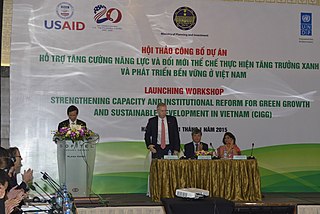
Appropriate technology is a movement encompassing technological choice and application that is small-scale, affordable by its users, labor-intensive, energy-efficient, environmentally sustainable, and locally autonomous. It was originally articulated as intermediate technology by the economist Ernst Friedrich "Fritz" Schumacher in his work Small Is Beautiful. Both Schumacher and many modern-day proponents of appropriate technology also emphasize the technology as people-centered.

International development or global development is a broad concept denoting the idea that societies and countries have differing levels of economic or human development on an international scale. It is the basis for international classifications such as developed country, developing country and least developed country, and for a field of practice and research that in various ways engages with international development processes. There are, however, many schools of thought and conventions regarding which are the exact features constituting the "development" of a country.
The United Nations defines community development as "a process where community members come together to take collective action and generate solutions to common problems." It is a broad concept, applied to the practices of civic leaders, activists, involved citizens, and professionals to improve various aspects of communities, typically aiming to build stronger and more resilient local communities.

Primary health care (PHC) is a whole-of-society approach to effectively organise and strengthen national health systems to bring services for health and wellbeing closer to communities.

Capacity building is the improvement in an individual's or organization's facility "to produce, perform or deploy". The terms capacity building and capacity development have often been used interchangeably, although a publication by OECD-DAC stated in 2006 that capacity development was the preferable term. Since the 1950s, international organizations, governments, non-governmental organizations (NGOs) and communities use the concept of capacity building as part of "social and economic development" in national and subnational plans. The United Nations Development Programme defines itself by "capacity development" in the sense of "'how UNDP works" to fulfill its mission. The UN system applies it in almost every sector, including several of the Sustainable Development Goals to be achieved by 2030. For example, the Sustainable Development Goal 17 advocates for enhanced international support for capacity building in developing countries to support national plans to implement the 2030 Agenda.

Participatory technology development (PTD) is an approach to learning and innovation that is used in international development as part of projects and programmes relating to sustainable agriculture. The approach involves collaboration between researchers and farmers in the analysis of agricultural problems and testing of alternative farming practices.
Participatory GIS (PGIS) or public participation geographic information system (PPGIS) is a participatory approach to spatial planning and spatial information and communications management.
The Comilla Model was a rural development programme launched in 1959 by the East Pakistan Academy for Rural Development. The academy, which is located on the outskirts of Comilla town, was founded by Akhter Hameed Khan, the cooperative pioneer who was responsible for developing and launching the programme.

Rural development is the process of improving the quality of life and economic well-being of people living in rural areas, often relatively isolated and sparsely populated areas. Often, rural regions have experienced rural poverty, poverty greater than urban or suburban economic regions due to lack of access to economic activities, and lack of investments in key infrastructure such as education.

The water supply and sanitation sector in Ghana is a sector that is in charge of the supply of healthy water and also improves the sanitation of water bodies in the country.
Maurice Lee "Maury" "Quickshot" Albertson, PhD, civil engineer, a teacher of water resources management over a long career at Colorado State University in Fort Collins, Colorado and former head of the Colorado State University Research Foundation.
Grassroots Support Organizations (GSOs) are a specialized subset of Intermediate Non-Governmental Organizations (INGOs) that provides services and support to local groups of disadvantaged rural or urban households and individuals.

Strengthening Participatory Organization is the largest rights-based national support organization in Pakistan working since 1994 to strengthen and support community organizations and public interest institutions for promotion of democratic governance, social justice, peace and social harmony. SPO engages civil society networks, faith-based organisations and groups representing a wide range of stakeholders.
Community-driven development (CDD) is an initiative in the field of development that provides control of the development process, resources and decision making authority directly to groups in the community. The underlying assumption of CDD projects are that communities are the best judges of how their lives and livelihoods can be improved and, if provided with adequate resources and information, they can organize themselves to provide for their immediate needs. CDD projects work by providing poor communities with direct funding for development with the communities then deciding how to spend the money. Lastly, the community plans and builds the project and takes responsibility for monitoring its progress.
The International Fund for Agricultural Development (IFAD) is an international financial institution and a specialized agency of the United Nations dedicated to eradicating rural poverty in Vietnam and other developing countries. IFAD supports more than 200 ongoing programmes and projects around the world.
The Aga Khan Rural Support Programme (AKRSP) is a private, non profit organization, established by the Aga Khan Foundation in 1982 to help improve the quality of life of the villagers of Gilgit-Baltistan and Chitral. It is a Non Governmental Organization which is part of the Rural Support Programmes Network in Pakistan.

The IBON Foundation is a non-profit research, education and information-development institution with programs in research, education and advocacy based in the Philippines. It provides socioeconomic research and analysis on people's issues to various sectors. It aims to contribute to people's empowerment through education and advocacy support. The foundation is also engaged in international solidarity work.

Shoaib Sultan Khan NI is one of the pioneers of rural development programmes in Pakistan. As a CSP Officer, he worked with the Government of Pakistan for 25 years, later on he served Geneva based Aga Khan Foundation for 12 years, then UNICEF and UNDP for 14 years. Since his retirement, he has been involved with the Rural Support Programmes (RSPs) of Pakistan full-time, on voluntary basis. Today, the Rural Support Programmes have helped form 297,000 community organisations in 110 districts including two Federally Administered Tribal Areas of Pakistan.
Nehru Foundation for Development (NFD) is a charitable trust dedicated to rural development and environment awareness. It was founded by Vikram Sarabhai in 1965. The foundation is dedicated to promoting basic environmental education and thinking on current problems of development at individual and the societal level.

The Nigerian Capital Development Fund (NCDF) is an organization dedicated to impact investing and promoting economic development in Nigeria. Established with the aim of fostering a resilient entrepreneurial ecosystem, NCDF provides essential support, capital, and resources to entrepreneurs, start-ups, and early-stage businesses. The organization's efforts are focused on facilitating job creation, product development, market expansion, and overall economic growth within the country.











